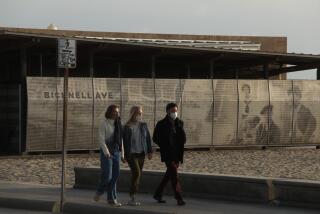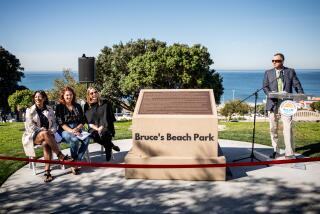From the archives: S. Africa Opens Beaches, Targets Apartheid Law
- Share via
JOHANNESBURG, South Africa -- President Frederik W. de Klerk, taking his first important step toward dismantling apartheid, declared South Africa’s remaining whites-only beaches open to blacks Thursday and promised to scrap a 36-year-old law that enables local officials to segregate such public facilities as parks, meeting halls and libraries.
“The government is not playing games. There is no alternative for South Africa but the road of reconciliation and of creating opportunities for all people of this country in a way which is just, fair and equitable,” De Klerk told a presidential advisory group in Cape Town.
For whites “to cling to power means accepting the risk--more than a risk, facing a revolution,” De Klerk said. “Nowhere in the world has a minority clung to power without that result.”
De Klerk’s announcement that “all beaches will henceforth be accessible to all members of the public” will affect only about a dozen beaches that remain segregated. Most beaches on South Africa’s 2,700-mile-long coast have been integrated for several years.
However, the decision to repeal the Separate Amenities Act “as soon as possible” after the new session of Parliament convenes in February is a sharp rebuke to the country’s right-wing whites. It marks one of the more significant policy changes in the ruling National Party’s 41-year history. Until Thursday, the government had supported separate public facilities for those who wanted them.
The law, known formally as the 1953 Reservation of Separate Amenities Act, has allowed local town councilors, at their discretion, to segregate buses, toilets, swimming pools, beaches and any other land, building or vehicle to which the public has access.
The law was imposed in response to the 1952 Defiance Campaign, led by Nelson R. Mandela and other black nationalists. It specifically decrees that the separate facilities do not have to be equal.
Although most public amenities have been opened to all races in major South African cities in recent years, whites-only facilities still exist in the capital, Pretoria, and many rural communities. Several industrial cities near Johannesburg used the act to reimpose segregation after the far-right Conservative Party took power in municipal elections last year.
Conservative spokesman Koos van der Merwe said De Klerk’s announcement is “yet another broken National Party promise,” and he predicted “the beginning of the end of a separate white community life.”
“Mr. De Klerk is placing South Africa on the road to a totally racially mixed South Africa, which will inevitably be governed by a black majority,” Van der Merwe said.
But Zach de Beer, co-leader of the liberal white Democratic Party, said he is “very pleased” with De Klerk’s decision.
“We’ve said for a long time that whenever Mr. De Klerk does anything to create a more open and more equal society, he will have our support,” De Beer said. He added that the segregated public facilities “were already on their way out, and it’s a pity that the government so often recognizes reality in this tardy manner instead of taking the lead in reform.”
The Mass Democratic Movement, the anti-apartheid coalition that has led a nationwide defiance campaign against discriminatory laws since August, welcomed the decision but said the law should never have been passed in the first place.
“This is only a reflection of the strength of mass action when it comes to putting pressure on the government,” said Murphy Morobe, a Mass Democratic Movement leader.
The repeal of the Separate Amenities Act would still leave several important pillars of apartheid. Under South African law, residential neighborhoods, public hospitals and public education remain segregated. Population Registration still officially classifies each person in South Africa by race. The political system, which denies the 26 million blacks a vote in national affairs, remains dominated by the nation’s 5 million whites.
De Klerk has said he wants to maintain racially separate housing, hospitals and schools for those who want them. But since he took office in August, the president has launched a broad program of reform to create a climate for black-white negotiations.
The government has plans to designate certain neighborhoods as multiracial, and De Klerk says his goal is a new constitution that would extend voting rights to blacks while protecting white interests.
However, anti-apartheid leaders have refused to negotiate until the government ends a 3 1/2-year-old state of emergency, lifts restrictions on black political organizations and releases political prisoners, including Mandela.
De Klerk made his remarks at a meeting of the President’s Council, whose members murmured in surprise when the president revealed his plans. Five years ago, the council recommended that the Separate Amenities Act be repealed.
Although De Klerk promised quick action on the act, he said the government will first carefully consider “the implications of such a step.” And he said “fitting measures” will be taken to make sure this does not lead to overcrowding or an increase in crime. He did not elaborate.
However, De Klerk said racial separation at beaches is an area in which a decision can be taken immediately, as the Southern Hemisphere’s summer vacation season begins. He asked local officials to “act in the spirit of this decision” and open their segregated beaches.
About a dozen beaches in small resort towns along the Cape province coast remain reserved for whites.
Times staff writer Norman Kempster, in Washington, contributed to this story.
More to Read
Sign up for Essential California
The most important California stories and recommendations in your inbox every morning.
You may occasionally receive promotional content from the Los Angeles Times.














